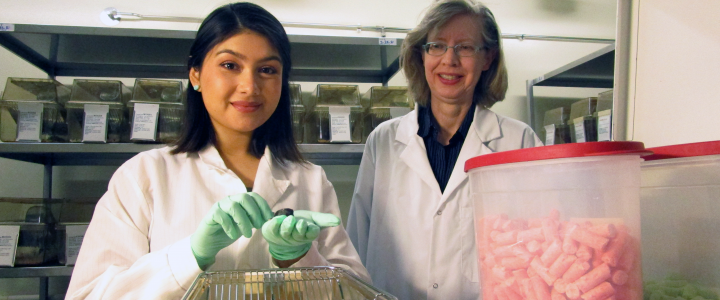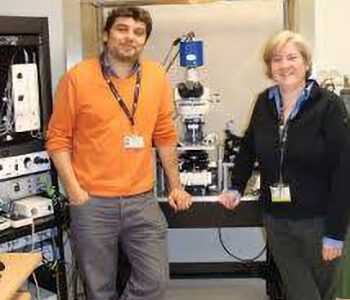All cells have a kind of housecleaning service which sweeps away genetic errors. This is called nonsense-mediated mRNA decay (NMD). With a previous FRAXA grant, this team discovered runaway NMD in cells of Fragile X patients. It’s not yet known how this impacts people with Fragile X. With this grant, Dr. Maquat and Dr. Kurosaki will test drugs which can bring NMD back to normal levels.
Read moreTreatment Targets
Link Between Lipid Profile, eCBome System and Gut Microbiome in Fragile X Syndrome

Why does obesity challenge so many people with Fragile X? Dr. Caku’s team thinks changes in the gut are the culprit. This team has found that Fragile X syndrome causes changes in the tiny organisms that live in our gut. They believe that these abnormalities cause changes in the brain which impair learning and behavior.
Read morePreclinical Testing of High Fat/Low Carb Diets in Fragile X Mice and Cells

With a $90,000 research grant from FRAXA, Dr. Cara Westmark’s team will use mice to determine if more palatable Atkins-type diets can improve sleep and boost learning skills for those with Fragile X syndrome.
Read morePharmacotherapeutic Effects of Cannabidiol (CBD) in Fragile X syndrome (FXS) and Autism Spectrum disorder (ASD)

This study will test CBD (cannabidiol) treatment in male and female Fragile X mice to learn how and why it works and whether gender affects responses to CDB treatment. Along with clinical trials, this study will help us to understand and optimize the potential of CBD as a behavior-regulating treatment for Fragile X.
Read moreCellular-Specific Therapeutic Targeting of Inhibitory Circuits in Fragile X Syndrome

Studies have shown that the function of inhibitory networks is disturbed in Fragile X. This abnormality is not well understood but appears to be secondary to abnormalities in metabotropic glutamate and endocannabinoid systems. With a $90,000 grant from FRAXA, Dr. Molly Huntsman’s team examined how these networks interact and how inhibitory deficits can best be remedied.
Read moreScreening Combinatorial Pharmacological Therapies for Fragile X Syndrome

FRAXA Research Foundation has awarded a $90,000 research grant to Stanford University principal investigators Dr. Philippe Jacques Mourrain and Dr. Gordon Wang, along with postdoctoral fellow, Dr. Rochelle Coulson. They are evaluating additive effects of combinatorial drug treatments to correct a broad spectrum of deficits observed in Fragile X syndrome.
Read moreTargeting Adiponectin to Treat Fragile X Syndrome

FRAXA Research Foundation has awarded a $30,000 research grant to principal investigator Brian Christie, PhD, and postdoctoral fellows Jonathan Thacker, PhD, and Luis Bettio, PhD, at the University of Victoria. They are investigating whether boosting the hormone adiponectin can effectively treat Fragile X syndrome. This project is funded in partnership with the Fragile X Research Foundation of Canada, which is providing an additional $15,000.
Read moreTargeting Mitochondria in Human Fragile X Syndrome Neurons

FRAXA Research Foundation has awarded a $90,000 research grant to principal investigator Dr. Xinyu Zhao and postdoctoral fellow Dr. Minjie Shen at the University of Wisconsin. They are investigating whether drugs which boost mitochondria — which provide the energy for cells — could treat Fragile X syndrome. Dr. Zhao explains in this video.
Read moreCorrecting Sensory Processing in Fragile X Mice by Modulating Kv3.1

FRAXA awarded a $90,000 grant to Carlos Portera-Cailliau, PhD and Nazim Kourdougli, PhD at UCLA to investigate whether a novel drug can rescue sensory processing deficits in Fragile X mice. People with Fragile X have similar problems in sensory processing. This new drug acts on Kv3.1, a promising Fragile X treatment target also being pursued by UK-based Autifony Therapeutics based on FRAXA-funded research done at Yale.
Read moreEnhancing NMDA Receptor Signaling to Treat Fragile X Syndrome

Dr. Stephanie Barnes investigated the role of NMDA receptors as a FRAXA Postdoctoral Fellow in Dr. Emily Osterweil’s laboratory at the University of Edinburgh from 2016-2018. With an additional year grant from FRAXA, she then continued her work to identify novel targets and test pharmacological therapies in the Fragile X mouse model at the Picower Institute at MIT with Dr. Mark Bear. Results published.
Read moreScreening 2,320 FDA-Approved Drugs for Potential Treatment of Fragile X

FRAXA Research Foundation has awarded a $90,000 grant to Principal Investigator Dr. Sean McBride and Postdoctoral Fellow Dr. Karen Joyce, at Rowan University, to screen all 2,320 FDA-approved drugs on both mouse and fly models of Fragile X syndrome. Those drugs which show promise will be tested in more detail for potential to treat Fragile X in humans.
Read moreNovel Modulators of Potassium Channels to Treat Fragile X

With funding from FRAXA over 2015-2017, the Yale University team of Leonard Kaczmarek, PhD showed that the firing patterns of auditory neurons in response to repeated stimulation is severely abnormal in Fragile X mice. Based on these results, they are collaborating with the UK-based company Autifony to develop advanced compounds which may reverse these deficits.
Read moreCoffee, Tea, and Chocolate: Adenosine Receptors in Fragile X

Caffeine is the most popular smart drug in the world. With a $90,000 grant from FRAXA Research Foundation, Alberto Martire, PhD and Antonella Borreca, PhD in Rome, Italy are investigating adenosine receptors antagonists to treat Fragile X syndrome. Compounds which are able to block adenosine receptors are commonly found in tea, chocolate, and coffee.
Read moreResearch Points to Drugs which Inhibit PDE to Treat Fragile X

FRAXA Research Foundation funded a grant of $90,000 over 2016-2018, for a postdoctoral fellowship for Thomas Maurin, PhD, working under the mentorship of Dr. Barbara Bardoni at INSERM in France. The team works on the biochemistry of the Fragile X protein. They have found that PDE inhibitors (a class of drugs) show promise as treatments for Fragile X syndrome. In related research, FRAXA is currently funding a clinical trial of PDE4D inhibitors.
Read moreMetformin and Aberrant Insulin Signaling in a Fragile X Mouse Model

This 2017-2018 grant of $90,000 is funded jointly by FRAXA and the Fragile X Research Foundation of Canada for the first year. A previous FRAXA grant to the Sonenberg lab has led to great interest in the available drug, metformin, as a potential treatment for Fragile X syndrome. FRAXA is currently organizing clinical trials of metformin.
Read moreNKCC1 Inhibitor Bumetanide Corrects Synaptic and Circuit Hyperexcitability in Fragile X Mouse Model

With $258,000 in grants since 2013 from FRAXA Research Foundation, Dr. Anis Contractor and Dr. Qionger He at Northwestern University are exploring the potential of the available drug bumetanide to correct altered GABA signalling in a mouse model of Fragile X syndrome.
Read moreUnderstanding and Reversing Hypersensitivity to Sounds in Fragile X Syndrome

With a $90,000 grant from FRAXA Research Foundation over 2018-2019, Drs. Devin Binder, Iryna Ethell, and Patricia Pirbhoy at the University of California at Riverside aim to understand – and reverse – hypersensitivity to sound in Fragile X syndrome.
Read moreThree-Dimensional Model for Identifying Fragile X Treatments

With a $90,000 grant from FRAXA Research Foundation awarded in 2018, Dr. Peng Jin and Dr. Juhnee Kang at Emory University will develop and analyze Fragile X brain organoids to understand the disorder and identify treatment targets.
Read morePharmacological Tolerance in the Treatment of Fragile X Syndrome

With a $90,000 grant from FRAXA Research Foundation over 2018-2019, Dr. Patrick McCamphill, postdoctoral fellow in Dr. Mark Bear’s lab at Massachusetts Institute of Technology (MIT), is investigating drug tolerance to mGluR5 antagonists, arbaclofen, and other potential Fragile X treatments. He is also exploring ways to overcome it.
Read moreCombinatorial Drug Treatment in a Model of Fragile X Syndrome using Novel Biomarkers

With a $90,000 grant from FRAXA Research Foundation awarded over 2016-2017, University of California researchers Khaleel Razak, PhD, and Jonathan W. Lovelace, PhD, are exploring drug combinations to limit hypersensitivity to sounds in Fragile X mice.
Read moreMicroRNA Mediated Astroglial GLT1 Dysregulation in Fragile X

Almost all brain research focuses on neurons – nerve cells. However, the brain has many more glial cells which support, nourish, and protect the neurons. FRAXA Research Foundation awarded a 2017 grant $90,000 to support Dr. Yang’s studies of how changes in glial cells contribute to Fragile X syndrome. This grant is funded by a grant from the Pierce Family Fragile X Foundation.
Read moreAutophagy is a Novel Therapeutic Target of Impaired Cognition in Fragile X Syndrome

Dr. Suzanne Zukin, at Albert Einstein College of Medicine, is expert on signaling pathways in the brain and the regulation of synaptic plasticity. With this 2017 grant of $90,000 from FRAXA Research Foundation, she and her team are exploring autophagy, which is how cells clean house, in Fragile X.
Read moreDefining Subcellular Specificity of Metabotropic Glutamate Receptor (mGluR5) Antagonists

With $217,500 in grants from FRAXA Research Foundation, Dr. Karen O’Malley and team studied the function of mGluR5 when it is inside cells. Many of the symptoms of Fragile X Syndrome (FXS) are thought to arise due to overactive metabotropic glutamate receptor 5 (mGluR5) signaling, which is normally opposed by the protein missing in FXS, Fragile X Protein (FMRP).
Read moreMechanisms of Tolerance to Chronic mGluR5 Inhibition

Over the past few years, both Novartis and Roche sponsored large-scale clinical trials of metabotropic glutamate receptor 5 (mGlu5) negative allosteric modulators (NAMs) to treat Fragile X syndrome (FXS). With a $90,000 grant from FRAXA Research Foundation in 2015-2017, Dr. Mark Bear’s team will explore if mGlu5 NAMs dosed chronically causes tolerance, and if so, how it develops and to probe new avenues to prevent or circumvent it.
Read morePrefrontal Cortex Network (PFC) Dynamics in Fragile X Syndrome

With a $90,000 grant from FRAXA Research Foundation from 2016-2017, Dr. Daniel Johnston and Dr. Jenni Siegel at the University of Texas at Austin are analyzing pre-frontal cortex (PFC) dysfunction in the Fragile X model. They have preliminary evidence that Fragile X mice are severely impaired in a prefrontal cortex (PFC)-dependent task.
Read more
